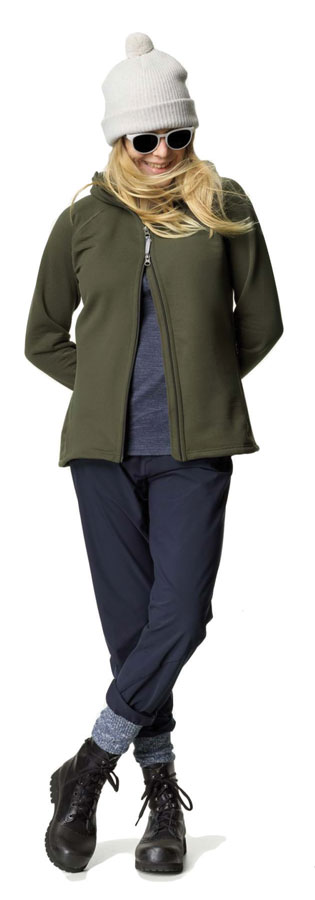
Houdi fleece jacket
Houdini’s Mono Air Houdi jacket made using Polartec® Power Air™ is helping to fight plastic waste.
By Rachael S. Davis, Executive Editor
Plastic is a large contributor to marine debris, and microfiber shedding from clothing during laundering has been identified as a contributor to microplastics — plastic debris less than 5 millimeters in length — in oceans and lakes. It’s an emerging field of study, and the full impact of such microplastics is not yet known. But companies are taking notice and introducing products designed to reduce the environmental impact of textiles.
Andover, Mass.-based Polartec LLC — a Milliken & Company business — recently introduced Polartec® Power Air™. The knit construction of the fabric is designed to encapsulate air and retain warmth while also reducing the amount of microfiber shedding, which can be especially problematic with fleece-type fabrics. According to Polartec, the fabric “offers advanced thermal efficiency by encapsulating lofted fibers within a multilayer, continuous yarn fabric construction which reduces shedding,” by at least five times when compared to other premium mid-layer-weight fabrics.
Polartec Power Air is made using recycled polyester and elasterall-p, which makes it 100-percent recyclable and circular, according to the company. The fabric also is highly durable and resists pilling.
Sweden-based Houdini — an outdoor company focused on sustainable apparel — selected Polartec Power Air for its Mono Air Houdi fleece jacket. As part of its mission to help designers fight plastic waste, Houdini has made the work behind the jacket — including the design, stitching patterns and list of components — available online for download through the Project Mono Air open-source initiative. The company’s goal is to encourage the apparel industry to become circular and waste-free — a vision that Houdini believes will require collaboration and considerable transformation in the industry.
“The apparel industry is advancing when it comes to sustainable solutions, which is great,” said Eva Karlsson, Houdini CEO. “But we need to speed up the pace. The insight that sparked the idea of Project Mono Air was that if we want to really change the industry for the better, we can’t keep our innovations and discoveries to ourselves. If we all share the problem, why not also share the solutions?”
“The goal with the open-source project is not to create identical copies of the Mono Air, but to let the work behind it become useful in the development of new products,” said Jesper Danielsson, head of Design and Innovation, Houdini. “If this can lead to new circular breakthroughs in the fashion industry — be it in the hands of a basement designer or billion-dollar brand — we are on the right path.”
“Polartec Power Air is a step forward in reducing the environmental impact of what we make and wear,” said Steve Layton, Polartec president. “It’s processes and constructions like these, which make circularity possible. And it’s designs like Houdini’s which help show the world how clothing can be made sustainably.”
For more information about Polartec® Power Air™, contact Emerald Stocker, +281-546-0777; emerald@fieldingmiller.com; polartec.com.
For more information about Project Mono Air, visit houdinisportswear.com.
November/December 2020




